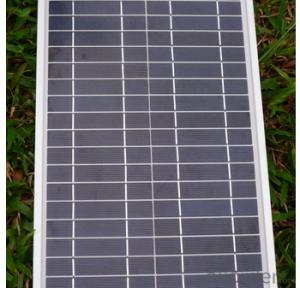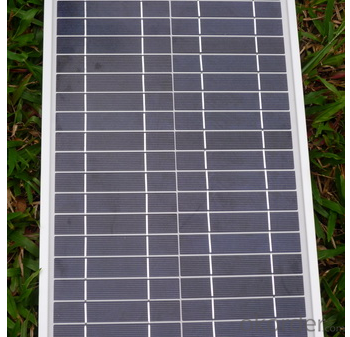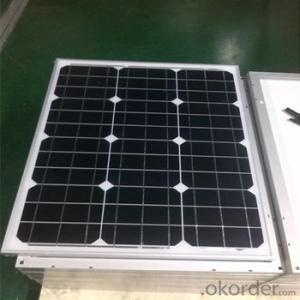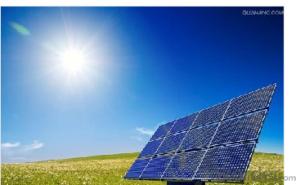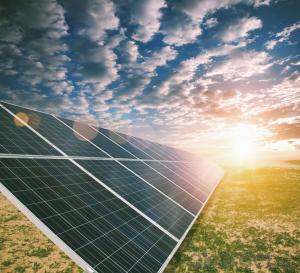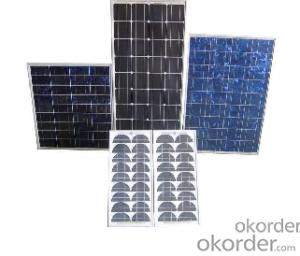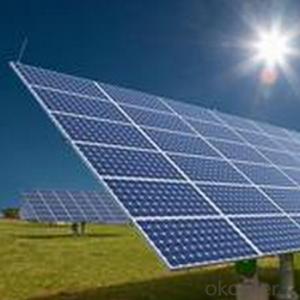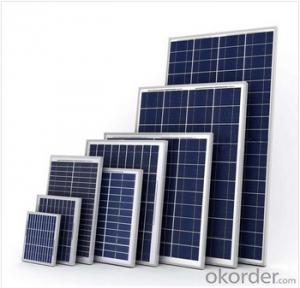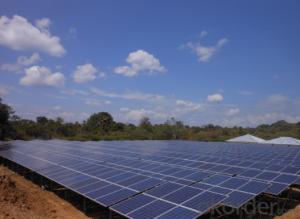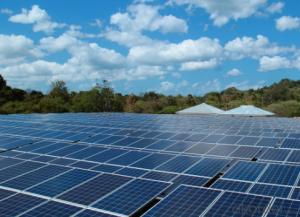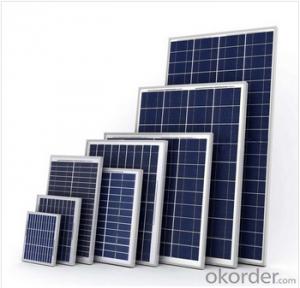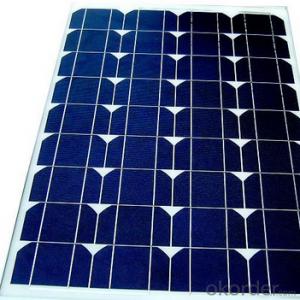Kansas City Solar Panels - High Power Poly Solar Panel/Module ICE 39
- Loading Port:
- China main port
- Payment Terms:
- TT OR LC
- Min Order Qty:
- 200 watt
- Supply Capability:
- 50000 watt/month
OKorder Service Pledge
OKorder Financial Service
You Might Also Like
Instruction
Format : 156 mm × 156 mm ± 0.5 mm
Thickness: 210 μm ±40 μm
Feature
1. High efficiency and High power.
2. Long-term electrical stability.
3. Lowest price and Fastest delivery.
4. Good quality and best service.
5. Bulk supply
Images
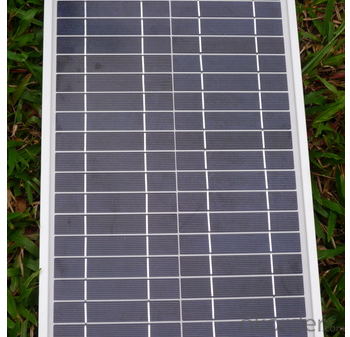
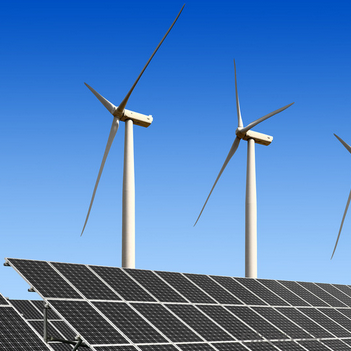
Specification
Electrical Characteristic of Mono Solar Cells
Model Type | |
Peak Power-Pmax(W) | 185 |
Open Circuit Voltage-Voc(V) | 44.2 |
Maximum Power Voltage-Vmp(V) | 36 |
Short Circuit Current-Isc(A) | 5.4 |
Maximum Power Current-Imp(A) | 5 |
Maximum System Voltage | 1000V DC |
Maximum Series Fuse Rating | 10A |
Power Tolerance | -1~+3% |
Temperature Coefficients of Pmax | -0.45%/℃ |
Temperature Coefficients of Voc | -0.348%/℃ |
Temperature Coefficients of Isc | 0.031%/℃ |
Nominal Operating Cell Temperature | 44.5±2℃ |
Standard Testing Condition(STC) | Irradiance:1000W/m²;Temperature:25℃;AM=1.5 |
Qualification Test Parameters | |
Operating Temperature | -40℃~+85℃ |
Storage Temperature | -40℃~+85℃ |
Pressure Bearing | ≥5400Pascal/m² |
Wind Bearing | ≥5400Pascal/m² |
Mechanical Characteristics | |
Cell Size | Mono 125*125mm±0.5 |
No.of Cells | 72pcs(6*12) |
Dimension | 1580*808*40mm |
Weight | 15.5Kg |
Glass | 3.2mm High Transmission,Low Iron |
Frame | Anodized Aluminum Alloy |
Junction Box | IP65Rated |
Internal Diodes | 3 Bypass Diodes |
Cable | 1*4.0mm² Length 900mm |
FAQ
We have organized several common questions for our clients,may help you sincerely:
1. What’s price per watt?
A: It’s depends on the quantity, delivery date and payment terms of the order. We can talk further about the detail price issue. Our products is high quality with lower price level.
2. Can you tell me the parameter of your solar cells?
We have different series of cells with different power output, both from c-si to a-si. Please take our specification sheet for your reference.
3. How do you pack your products?
We have rich experience on how to pack the panels to make sure the safety on shipment when it arrives at the destination.
- Q: I have a playstation PSP charger that is 5v 2A, so it takes 0 watts.I have several small solar panels that put out watt a piece and are 4 volts, 250mAhow can I get my 0 watts to be 5v 2A instead of 4v 250mA? the voltages have to match up right?also, what's a 3-T regulator that controls voltage?
- 3-T is just one type of many devices designed to control voltage so you get the amount you desire with as little static as possible. Without you having an degree in engineering, I can't explain it to you any better. You will also need to produce true sine wave energy or you will burn out your PSP with the correct volts and amps. You need one to produce only 5 volts 2amps. Anything different will burn out yur PSP. Your problem is simple math. Watts = volts multiplied by amps. Amps = Watts divided by volts. So if your solar panels can produce /4 amp ( 250 mA) each, then you connect one to the other in a series until you get enough connected to make 2A. ( 8 panels { /4mA x 8 = 2A}) You now have a panel with 32Volts, 2Amps, 64 Watts. This is where the T-3 regulator comes in. If you buy one for 5 volts, it will allow only 5 volts 2 amps, to go to your PSP.
- Q: Can solar panels be used to power a theme park?
- Yes, solar panels can be used to power a theme park. Solar panels can generate electricity from sunlight, providing a sustainable and renewable energy source. By installing a sufficient number of solar panels, a theme park can meet its energy needs and reduce its reliance on traditional power sources, contributing to environmental sustainability.
- Q: A few months ago my dad said something about getting solar panels, and how green they were. I was just wondering if there were any companies that sold them and if they would actually make a big difference.
- It okorder They will rent you a solar panel system. You will pay a flat monthly rental rate that would be locked in for up to 25 years. There's no installation cost, No system to purchase, No permit hassles, No Maintenance fees and a locked in rate for up to 25 years. Check it out. I think you would like it. You won't own the system but you will save money and help our environment in a huge way. Also by renting a system you save yourself from future advances in solar. Example Things are changing fast in the solar industry. If you go out and buy a system for $40000 today and next week comes around and you can get a cheaper, more effecient system you would still have to pay for the one sitting on your roof.
- Q: I'm doing a science fair experiment with a tiny two-inch solar panel that only gives off like .5 volts of energy, but I need to know how many volts an average sized solar panel (like one you'd get to run your house) would produce. And how many panels do people usually get?
- You should read up on the different electrical units. You say .5 volts of energy, but this makes little sense. Energy is measured in Joules. Power in Watts. Solar panels will produce different voltages and currents, depending on the amount and angle of sunlight hitting them. Power = volts * amps. Before installing solar panels a home owner should do an energy audit to find out how much power they currently use - and how much that could be reduced with some easy changes. Solar panels are expensive, so it makes sense to reduce the amount that you need to install. In some places you can sell extra power back to your utility - so having extra panels might give you some small amount of money back - but this is rarely enough to justify the cost of the extra panels. I put 28 panels on my house (see picture in source URL). My utility has tiered pricing for electricity (first few kWh each month are cheap, but price for extra ones goes up in stages). My panels keep me from having to pay the higher rates.
- Q: how much power is generated with solar panels? also please give me links for that information.and how much would the costs be for this alternative energy source?
- If you put 'solar world statistics' into a search engine, you will discover that there are many statistics that are being heavily contested. Picking up the truth from among hype is the task. Solar panels typically have a rated maximum output of about 0 watts per sq metre. But actual delivery to grids of kWh would point to a number closer to 4 watts / sq M. on a 24 hour basis. Grid management is thus cautious about yield claims when history points to only /8 of rated maximum output. There may be some inappropriate expectations, when a solar roof is first powering the building, and only selling excess to the grid.
- Q: Can solar panels be installed on a pole or ground mount?
- Yes, solar panels can be installed on both poles and ground mounts. Pole-mounted solar panels are typically used in situations where there is limited space or when the panels need to be elevated for better sunlight exposure. Ground-mounted solar panels are commonly used in larger installations or when there is ample available land. Both options offer flexibility in placement and can effectively harness solar energy.
- Q: What is the maintenance cost of solar panels?
- The maintenance cost of solar panels is generally low. Routine maintenance involves cleaning the panels periodically to remove dirt or debris, which can be done by the owner or a professional cleaning service. Additionally, inspecting the panels for any signs of damage or malfunctioning is recommended. Other than these basic maintenance tasks, solar panels do not require much ongoing maintenance and have minimal operational costs.
- Q: Can solar panels be used for heating a greenhouse?
- Yes, solar panels can be used for heating a greenhouse. Solar panels can generate electricity, which can then be used to power heaters or heat pumps inside the greenhouse to provide warmth. Additionally, solar panels can also be used to heat water, which can be circulated through pipes or radiators to provide radiant heat in the greenhouse.
- Q: Can solar panels be installed on backpacks or camping gear?
- Yes, solar panels can be installed on backpacks or camping gear. These portable solar panels are designed to be lightweight and flexible, making them suitable for outdoor activities. They can be used to charge small electronic devices like phones, tablets, or portable speakers while on the go, providing a convenient and sustainable power source.
- Q: Can you connect a solar panel to speakers that use a wall outlet plug, by cutting the plug off and connect copper wire between the solar panel and cord?Confusing i know. I'm trying to connect a solar panel to speakers for a science project.
- If you mean powered computer speakers, I think you have a chance. They're low power, and often low voltage. What you want is a parent or your science teacher to give you advice. You will want to find the kind of speaker that has a power adapter that plugs into the wall. The power adapter will put out, say, 6 volts at 200 mA. That's what you want to replace with the solar panel, not wire to the part that plugs into the wall.
Send your message to us
Kansas City Solar Panels - High Power Poly Solar Panel/Module ICE 39
- Loading Port:
- China main port
- Payment Terms:
- TT OR LC
- Min Order Qty:
- 200 watt
- Supply Capability:
- 50000 watt/month
OKorder Service Pledge
OKorder Financial Service
Similar products
Hot products
Hot Searches
Related keywords
